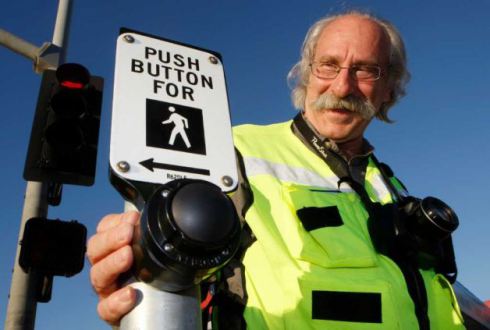You are currently browsing the monthly archive for September 2011.
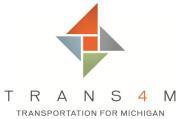 A two-day Odyssey on public transportation will start at Detroit Metropolitan Airport Saturday morning and conclude at a Monday meeting in Traverse City, Michigan: The Logistics Hub of the Midwest from 11:30 to 5:00 at the Grand Traverse Resort.
A two-day Odyssey on public transportation will start at Detroit Metropolitan Airport Saturday morning and conclude at a Monday meeting in Traverse City, Michigan: The Logistics Hub of the Midwest from 11:30 to 5:00 at the Grand Traverse Resort.
Along the way, members of the Transportation for Michigan (Trans4M) coalition and others will meet with lawmakers, local officials and citizens interested in improving the reliability and convenience of public transportation throughout Michigan.
“We want to draw attention to the strengths, weaknesses and opportunities in Michigan’s statewide passenger train and bus-transit systems,” said Tim Fischer, deputy policy director with the Michigan Environmental Council and a Trans4M member.
“It isn’t that someone can’t use public transportation to get from one end of the state to the other; it’s that it’s extremely difficult. A simple trip of a few hours becomes a two-day odyssey. There are too many unnecessary roadblocks placed in the way of streamlined public transit viability,” said Clark Harder, Executive Director of the statewide Michigan Public Transit Association, which represents bus, light rail and water ferry operators in Michigan.
Below is a tentative itinerary.
Saturday, Oct 1:
- Depart DTW airport at 8:25 am on SMART bus #125 for downtown Detroit
- Arrive at Larned & Woodward at 9:45 am
- Depart Larned & Woodward at 10:00 am or 10:11 am on DDOT bus #53 for the Detroit Amtrak Station
- Arrive at Detroit Amtrak Station by about 10:40 am
- Depart Detroit Amtrak Station at 11:23 am on Wolverine train #353 for Jackson Train Station
- Arrive at Jackson Train Station at 1:10 pm
- Meet with elected officials, others
- Depart Jackson Baymont Inn and Suites on Michigan Flyer motor coach #8017 at 4:30 pm for East Lansing
- Arrive in East Lansing at 5:10 pm at the University Place Marriot
- Meet with elected officials, others
Sunday, Oct. 2:
- Depart East Lansing at 11:00 am or 11:20 am on CATA bus #1 for Lansing Transit Center
- Arrive at Lansing Transit Center by 11:40 am
- Meet with elected officials, others
- Depart Lansing at 12:30 pm on Greyhound for Kalamazoo
- Arrive in Kalamazoo at 2:15 pm
- Meet with officials
- Depart Kalamazoo at 3:00 pm on Indian Trails motor coach #0082 for Grand Rapids
- Arrive in Grand Rapids at 4:00 pm
- Meet with officials
- Depart Grand Rapids at 4:50 pm on Indian Trails motor coach #0080 for Traverse City
- Arrive in Traverse City at 8:25 pm
Monday, Oct. 3:
Michigan: The Logistics Hub of the Midwest 10:30 am - 5:00 pm at the Grand Traverse Resort http://www.tcchamber.org/civicrm/event/info?reset=1&id=10254
More Transit Odyssey details at: http://www.facebook.com/event.php?eid=224812890908475¬if_t=event_photo_change
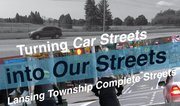 On September 13, 2011, Lansing Township passed a Complete Streets ordinance in order to promote the public health, safety, comfort, convenience, and general welfare for walking, bicycling, and public transportation and to encourage increased use of these modes of transportation as part of daily activities, while at the same time securing adequate traffic circulation to the roadways, streets and highways to achieve the maximum utility and livability on individual parcels. Lansing Township became the ninth community in Michigan to adopt a Complete Streets ordinance, but the first township to do so in the state.
On September 13, 2011, Lansing Township passed a Complete Streets ordinance in order to promote the public health, safety, comfort, convenience, and general welfare for walking, bicycling, and public transportation and to encourage increased use of these modes of transportation as part of daily activities, while at the same time securing adequate traffic circulation to the roadways, streets and highways to achieve the maximum utility and livability on individual parcels. Lansing Township became the ninth community in Michigan to adopt a Complete Streets ordinance, but the first township to do so in the state.
Because townships do not own their roadways and must work with and through county road commissions and the Michigan Department of Transportation to implement roadway projects, the ordinance is unique.
The Township committed to approaching every transportation project and program as an opportunity to collaboratively implement Complete Street practices and infrastructure in order to improve public and private streets and the transportation network for all users. It also recognizes public investments by prioritizing Complete Streets projects that are located near public service areas (e.g., schools, government facilities, libraries, public health facilities, parks, hospitals, etc.) and that provide improved access to healthy food (e.g., farmers markets, full service groceries, community gardens, etc.). The Township recognizes that not all modes of travel are appropriate on all streets and therefore outlines specific exceptions. The Township also has a detailed plan for collecting data and measuring the impact of their Complete Streets ordinance and projects.
This ordinance comes after a year-long process of exploring the benefits of Complete Streets and approaches to implementation with partners such as the Ingham County Health Department and Tri-County Regional Planning Commission. Lansing Township is also currently developing its non-motorized transportation plan which will help to implement the Complete Streets ordinance.
Reposted from LMB.org
CycleSafe to offer bike parking discounts to communities with Complete Streets and/or bike parking policies.
League of Michigan Bicyclists member [and Michigan Complete Streets Coalition partner], CycleSafe, Inc. is pleased to announce that they are now offering municipal discounts on their Michigan-made bicycle parking products to communities with either a Complete Streets resolution, Complete Streets ordinance, and/or a bike parking ordinance. The promotion is tiered, offering communities with ordinances larger discounts over communities with resolutions. Communities that have adopted both a Complete Streets ordinance and a bike parking ordinance are eligible for the greatest discounts.
CycleSafe manufactures a wide range of bicycle parking products from bicycle lockers and bicycle shelters to decorative bike racks, utilizing Michigan vendors with products still in use for over 30 years.
A letter from the Michigan Complete Streets Coalition will soon be mailed to all city council members, township supervisors, mayors and transportation officials in the over 50 Michigan communities who have adopted a Complete Streets ordinance or resolution congratulating them on their accomplishments and recommending a number of potential next steps on how to make their communities more pedestrian and bicycle friendly. The letter also references a number of available incentives for communities with Complete Streets policies, including this new bicycle parking discount.
Communities applying for the discount will need to provide a copy of their Complete Streets and/or bike parking policies and reference discount code MI-2012CS. For CycleSafe product information and to learn more about this new incentive, please contact CycleSafe by phone at (888) 950-6531 or by email at [email protected] or visit their website at www.cyclesafe.com.
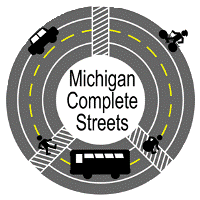 The last installment of the Complete Streets Institute lunchtime webinar series is scheduled for tomorrow, Wednesday September 28th at noon. Michigan Complete Streets Coalition partners, Norm Cox of the Greenway Collaborative, Inc. and Brad Strader, LSL Planning will be presenting Module 5 – Design and Applications. The free webinar will look at current best practices, including a number of new approaches.
The last installment of the Complete Streets Institute lunchtime webinar series is scheduled for tomorrow, Wednesday September 28th at noon. Michigan Complete Streets Coalition partners, Norm Cox of the Greenway Collaborative, Inc. and Brad Strader, LSL Planning will be presenting Module 5 – Design and Applications. The free webinar will look at current best practices, including a number of new approaches.
Complete Streets Institute: Module 5 - Design & Application
Wednesday September 28, 2011 from 12:00 PM to 1:30 PM
This is the fifth of a five-part webinar series on Complete Streets brought to you by the Michigan Department of Community Health. This module will provide an understanding of multi-modal users as well as the key principles that should be addressed in designing Complete Streets. The webinar will also show how Complete Streets elements may be integrated for travel along and across the roadway through numerous special cases. Presenters are Norman Cox of The Greenway Collaborative and Brad Strader, LSL Planning. Please click here to register for Module 5 Webinar.
Links to the previous presentations can be found here.
In recent AARP research, nearly 90% of the 45+ population indicated they would like to stay in their community for as long as possible and that it is important for them to remain near their family and friends, and be able to access services they need.
Livable Communities are places where people of all ages and abilities have, among other things, a range of travel choices to get safely where they need and want to go. These choices – walking, biking, driving and public transportation – help people stay connected and healthy. In a truly livable community, streets are built for people, not for cars, and downtowns are built for lingering and enjoyment, not for vehicle thru-put and getting commuters home faster after work.
You are invited to join AARP-MI and Dan Burden, Executive Director, Walkable and Livable Communities Institute, for an Active Living Workshop on Tuesday, September 27, 2011 from 8:30am – 2:30pm at Greater Grace Temple Banquet Center, 23500 Seven Mile, Detroit, MI 48219.
The goal of this workshop is to bring community leaders, elected officials and government staff together to engage in making their streets and neighborhoods more walkable and livable. The workshop will also illustrate through examples and audits how walkablility and livability benefit a community and how they can be achieved. Each participant will be inspired to become involved in the movement of active living. The workshop will focus on building healthy communities by applying the principles of active transportation, smart growth and complete streets.
If you would like to register for or learn more about the workshop, please contact Andrea Palmer at [email protected] or 1-866-227-7448. Responses are needed by September 23, 2011.
We hope that you or your representative will participate with AARP in this important community workshop.
The next regular meeting of the Complete Streets Advisory Council will be held on Thursday, September 29, 2011 in the Capitol Commons Center, 400 South Pine, Lansing, Michigan, commencing at the hour of 2:00 p.m.
All meetings of the Complete Streets Advisory Council are open to the public, and attendance is encouraged. Any individuals needing special assistance to attend the meeting should contact Michelle Myers in the Intermodal Policy Division at 517-241-0754. For those who cannot attend the meeting in person, but would like to listen to the proceedings, they can do so through a conference phone line by calling 877-873-8018 and using access code 6081517. Callers can submit their public comments in writing to:
Michelle Myers,
Departmental Specialist
Intermodal Policy Division
Michigan Department of Transportation
P.O. Box 30050, 425 W. Ottawa
Lansing, Michigan 48909
The meeting agenda is as follows:
- Welcome
- Approve Draft Minutes from July 28, 2011 meeting
- Public Comment
- Presentation on Torts and Liability
- Presentation on Context Sensitive Solutions
- Break
- Review Submitted Sample Policy Items
- Review Preliminary Draft Report
- Public Comment
- Adjournment
Draft minutes from the July 28th meeting can be downloaded at:
http://www.michigan.gov/mdot/0,1607,7-151-9623_31969_57564—,00.html
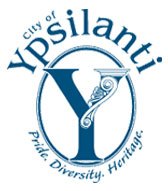 By Bob Krzewinski, Chair of the City of Ypsilanti Non-Motorized Advisory Committee
By Bob Krzewinski, Chair of the City of Ypsilanti Non-Motorized Advisory Committee
Over the summer of 2011, the City Council of the City of Ypsilanti voted on, and approved, a Complete Streets ordinance, becoming the 8th Michigan community to locally put Complete Streets into law. The Ypsilanti Complete Streets ordinance takes effect on September 17th, thirty days after the last of two required votes by City Council.
Complete Streets policies ensure that when roads are constructed, or rebuilt, they are designed and operated to enable safe access for all users. Pedestrians, bicyclists, motorists and transit riders of all ages and abilities can move safely along and across a Complete Street. They improve public safety and reduce crashes by providing dedicated pedestrian and bicycle infrastructure, such as safe crosswalks, sidewalks and on-road bicycle facilities such as bike lanes and sharrows.
Complete Streets also have an extra benefit in that they tend to boost local economies by increasing residential property values. Demand for walkable communities is growing across the country and home buyers are often willing to pay a premium to live in areas where they can safely walk and bike. Businesses located along Complete Streets corridors also often report increased sales after pedestrian, bicycle and transit facilities are installed.
Complete Streets also promotes public health by making it safe and convenient for children and families to incorporate physical activity into their daily lives. With Michigan’s rampant obesity epidemic, Complete Streets provides a golden opportunity to replace our crumbling transportation infrastructure with safe and convenient active transportation options.
By passing a Complete Streets ordinance, the City of Ypsilanti joins scores of communities across Michigan that are embracing Complete Streets, including Washtenaw County neighbors in Saline, Dexter and Ann Arbor.
With rising gasoline prices, more and more Michigan residents are walking and bicycling for both transportation and recreation. Complete Streets ordinances, such as recently enacted by the City of Ypsilanti, will certainly help make such activates not only more possible, but easier and safer.
Download Ypsilanti’s Complete Streets ordinance here.

